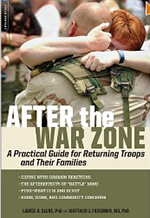CE Credit: 6 Hours (0.6 CEUs)
Target Audience: Psychology Counseling Social-Work Marriage-and-Family
Learning Level: Introductory
Course Abstract:
Note: this is a ‘test only’ course (does not include the book). The textbook can be purchased through Amazon or another source.
 This course is based on the book After the War Zone: A Practical Guide for Returning Troops and Their Families (2008, 304 pages) written by Laurie Slone, PhD and Matthew J. Friedman, MD, PhD, of the VA National Center for PTSD and Dartmouth Medical School. The book describes the experience of deployment and return from a war zone, typical experiences of military personnel, and issues relevant to special populations (women, ethnic minorities, peacekeepers, private contractors, and parents and extended family of affected individuals). It provides valuable insight into the military culture, as well as containing many useful military terms and definitions that would be essential for a lay clinician to know when working with military clients. As a psychoeducational tool for military personnel returning from Iraq and Afghanistan, this book may be used by clinicians as a recommendation for reading when conducting individual, family, or couples therapy with military patients or veterans. Course #60-88 | 2008 | 58 posttest questions
This course is based on the book After the War Zone: A Practical Guide for Returning Troops and Their Families (2008, 304 pages) written by Laurie Slone, PhD and Matthew J. Friedman, MD, PhD, of the VA National Center for PTSD and Dartmouth Medical School. The book describes the experience of deployment and return from a war zone, typical experiences of military personnel, and issues relevant to special populations (women, ethnic minorities, peacekeepers, private contractors, and parents and extended family of affected individuals). It provides valuable insight into the military culture, as well as containing many useful military terms and definitions that would be essential for a lay clinician to know when working with military clients. As a psychoeducational tool for military personnel returning from Iraq and Afghanistan, this book may be used by clinicians as a recommendation for reading when conducting individual, family, or couples therapy with military patients or veterans. Course #60-88 | 2008 | 58 posttest questionsLearning Objectives:
1. Define essential terminology relevant to the military and military operations, including the acronym BATTLEMIND.
2. Identify some basic information and statistics regarding today’s military and the conflicts in Afghanistan and Iraq.
3. List common practical issues for military personnel and their families before, during, and after deployment, and common solutions to those issues.
4. Identify common emotional experiences among military personnel and their families before, during, and after deployment.
5. Identify warning signs and symptoms of PTSD, TBI, alcohol and drug abuse, suicidal tendencies, and domestic violence among military personnel, and how these differ from common reactions to being in a war zone
6. Identify coping strategies that troops and their families can use to facilitate adjustment.
7. Identify special populations affected by the war in Iraq and Afghanistan and issues that are specific to those populations.
8. Identify federal laws and federal, private, and volunteer organizations that provide support to troops.
9. Apply information provided in this book to several case scenarios.
About the Author(s):
Laurie Slone, PhD, is the Associate Director for Research and Education of the VA National Center for PTSD and an assistant professor at Dartmouth Medical School.
Matthew J. Friedman, MD, PhD, is Executive Director of the VA National Center for PTSD and a professor of Psychiatry and of Pharmacology at Dartmouth Medical School.
CE Information:
Professional Development Resources is recognized as a provider of continuing education by the following:
APA: American Psychological Association
ASWB: Association of Social Work Boards (#1046)
NBCC: National Board for Certified Counselors (#5590)
NAADAC: National Association of Alcohol & Drug Abuse Counselors (#00279)
California: Board of Behavioral Sciences (#PCE1625)
Florida: Boards of SW, MFT & MHC (#BAP346); Psychology & School Psychology (#50-1635); Dietetics & Nutrition (#50-1635); Occupational Therapy Practice (#34). PDResources is CE Broker compliant.
Illinois: DPR for Social Work (#159-00531)
Ohio: Counselor, Social Worker & MFT Board (#RCST100501)
South Carolina: Board of Professional Counselors & MFTs (#193)
Texas: Board of Examiners of Marriage & Family Therapists (#114) & State Board of Social Worker Examiners (#5678)
ASWB: Association of Social Work Boards (#1046)
NBCC: National Board for Certified Counselors (#5590)
NAADAC: National Association of Alcohol & Drug Abuse Counselors (#00279)
California: Board of Behavioral Sciences (#PCE1625)
Florida: Boards of SW, MFT & MHC (#BAP346); Psychology & School Psychology (#50-1635); Dietetics & Nutrition (#50-1635); Occupational Therapy Practice (#34). PDResources is CE Broker compliant.
Illinois: DPR for Social Work (#159-00531)
Ohio: Counselor, Social Worker & MFT Board (#RCST100501)
South Carolina: Board of Professional Counselors & MFTs (#193)
Texas: Board of Examiners of Marriage & Family Therapists (#114) & State Board of Social Worker Examiners (#5678)
